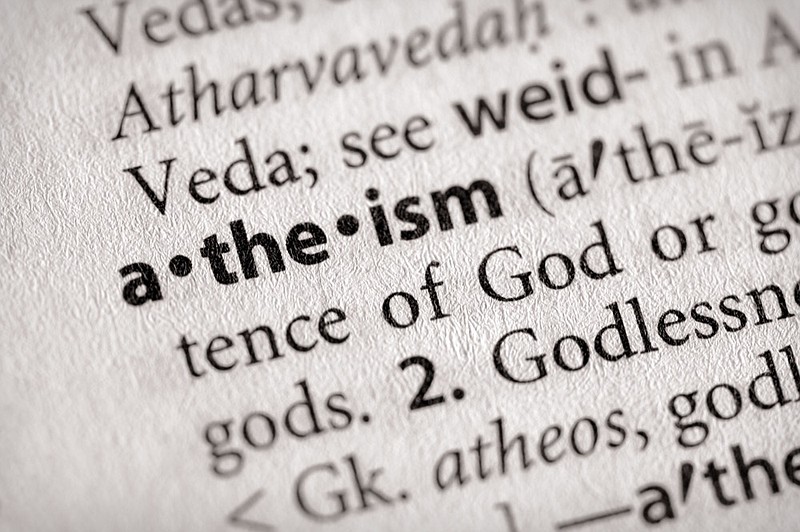EDITOR'S NOTE: This article is part of Religion: Got questions?, a series answering your biggest religious questions. Each week, we will answer one submitted faith question. To send a submission visit https://bit.ly/30cTYzx or email wmassey@timesfreepress.com.
Question: Why doesn't atheism get any coverage?
America is becoming less religious, and Chattanooga is no exception.
Atheism and the population of Americans who do not identify with religion is growing. A quarter of Americans identify as religiously "unaffiliated," meaning they could be atheist or agnostic, according to a survey by the Public Religion Research Institute. In Tennessee, 20% of residents identify with this group, a 5 percentage-point increase in the state from 2013.
However, many religious people do not know much about atheism, said Nick Fish, president of the advocacy group American Atheists.
"People hear what their pastors have said about atheists, and so we sort of fly under the radar," Fish said. "You don't immediately recognize an atheist on the street like you do a person of color or a LGBTQ person sometimes. It's easier for those misconceptions to take root and then just kind of sit there, because there's nothing to challenge those preconceptions."
A misconception Karl Kemerait has often come across is a belief that atheists worship the devil, instead of recognizing that while some atheists may believe in demons, they do not worship them, and there is a spectrum among the community that includes people who do not believe in anything supernatural.
"In most people's minds who are religious, I don't think they have a really clear idea of what it means to be an atheist," the 65-year-old Hixson resident said. "When you say you're an atheist, people say, 'Why do you hate god?' And no. I don't hate him. There's just nothing there."
The lack of public understanding about atheism leads to fewer meaningful conversations between the religious and nonreligious, Kemerait said.
The religious often believe the nonreligious have no moral framework, which is untrue, Fish said. Instead, atheists use reason and rationality to make decisions, rather than having their worldviews framed for them by a religious tradition. Religion has justified or been used to justify horrible events in history, he said, such as sexual abuse in Catholic and Southern Baptist churches, the crusades, Jim Crow laws and repressing women's rights.
More than three-quarters of atheists are 49 years old or younger, according to the Pew Research Center. More than 90 percent of atheists are white and the majority of them support the Democratic Party and various liberal positions, such as same-sex marriage and abortion rights.
Atheists are no more likely to be nihilists or fatalists than religious believers, according to a 2018 study in SAGE Open, an open-access, peer-reviewed academic journal. In fact, Fish said, not believing in religion gives people more freedom to improve the current world, rather than focusing on the afterlife.
"Being an atheist frees you up to take part in this world and make this world a better place," he said.
The growing population of atheists is leading to more news coverage of them, often because reporters are more likely to know someone who is atheist, Fish said. The views of evolutionary biologist Richard Dawkins and author Sam Harris often receive space in the New York Times, for instance. There was significant attention to when former megachurch pastor Dave Gass and Christian author Joshua Harris rejected religion.
Finding atheists can be difficult since they often do not have a designated meeting place, like a church.
"It's harder to track down the people who've left that," Fish said. "They don't just meet on Sundays to have an event every single week. It's harder to find those leaders or those people who are willing to speak for that community because it's more diffuse."
Atheism rejects the hierarchy of religion, such as having bishops or deacons, so no atheist speaks for all atheists, like church leaders can claim to do, Fish said.
"One thing that's been the most damaging to the credibility of religious leaders has been their eagerness to speak for all religious people on controversial religious issues or controversial moral issues. Then there is this huge disconnect between the laity and the leadership and especially the younger laity and the leadership," he said.
However, the media even covering atheism from a religious angle, as though it is one united group, is in itself ironic, Kemerait said.
"On the one hand, I find it ironic that religion reporters are reporting on atheism," he said. "Like, if we had reporters that we dedicated to people's personal hobbies, they wouldn't be interviewing people that didn't have one."
Contact Wyatt Massey at wmassey@timesfreepress.com or 423-757-6249. Find him on Twitter at @News4Mass.
